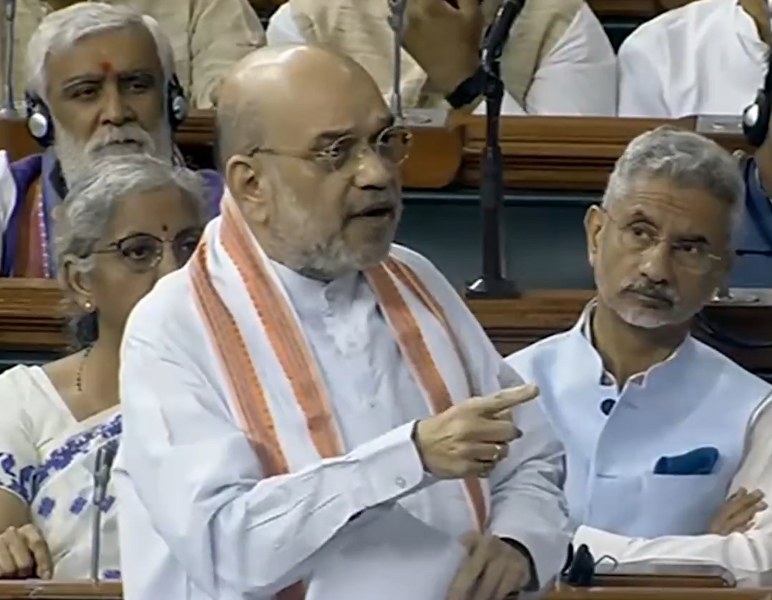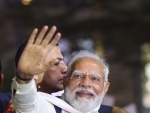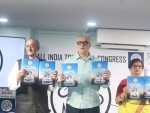 IPC
IPC Centre overhauls criminal laws to include maximum punishment for mob lynching, rape of minors
New Delhi: The Centre on Friday amended the extant criminal laws that were framed during India’s colonial era to include maximum punishment for crimes like mob lynching and rape of minors and a new crime "endangering unity" instead of sedition.
The Bharatiya Nyaya Sanhita will replace the Indian Penal Code of 1860, said Union Home Minister Amit Shah, introducing three bills.
The Code of Criminal Procedure will be replaced by the Bharatiya Nagarik Suraksha Sanhita and Indian Evidence Act will be replaced by the Bharatiya Sakshya Sanhita.
नए कानून में अब यौन शोषण के मामलों में पीड़िता के बयान की वीडियो रिकॉर्डिंग अनिवार्य होगी।
— Amit Shah (@AmitShah) August 11, 2023
90 दिन के अंदर जाँच अधिकारी द्वारा आरोप पत्र दायर करने की अनिवार्यता से जल्द से जल्द न्याय सुनिश्चित हो सकेगा। pic.twitter.com/mNgGGVaSJu
The three bills will now be reviewed by the Standing Committee of Parliament.
Revised laws now include a new offence related to acts of secession, armed rebellion, subversive activities, separatist activities, or actions that pose a threat to the sovereignty, unity, and integrity of India.
नए कानून में अंतरराज्यीय और संगठित अपराध के खिलाफ कठोर सजा का प्रावधान किया गया है। pic.twitter.com/KNT2JIUAb7
— Amit Shah (@AmitShah) August 11, 2023
The Home Minister has announced the repeal of the sedition law. It has been substituted with Section 150, which addresses actions that jeopardize the sovereignty, unity, and integrity of India.
"Whoever, purposely or knowingly, by words, either spoken or written, or by signs, or by visible representation, or by electronic communication or by use of financial means, or otherwise, excites or attempts to excite, secession or armed rebellion or subversive activities, or encourages feelings of separatist activities or endangers sovereignty or unity and integrity of India; or indulges in or commits any such act shall be punished with imprisonment for life or with imprisonment which may extend to seven years and shall also be liable to fine," says Section 150.
भारतीय न्याय संहिता बिल, भारतीय साक्ष्य बिल और भारतीय नागरिक सुरक्षा बिल में किए गए बदलाव से देश के क्रिमिनल जस्टिस सिस्टम का overhaul होगा और पीड़ितों को अधिक से अधिक 3 साल के अंदर पूर्ण न्याय मिल सकेगा। pic.twitter.com/UNvY6OcvFn
— Amit Shah (@AmitShah) August 11, 2023
The explanation states this: "Comments expressing disapprobation of the measures, or administrative or other action of the Government with a view to obtain their alteration by lawful means without exciting or attempting to excite the activities referred to in this section."
The new legislation gives precedence to laws concerning crimes against women and children, homicides, and "offences against the state."
Community service will now be introduced as a penalty for minor offenses, marking a major change.
Under the proposed law, individuals evading arrest can be subject to trial in their absence.
The police are required to provide updates on First Information Reports (FIRs) within 90 days, and the option to file an electronic FIR (E-FIR) is now available from any location.
The process of search and prosecution (challan) is now required to be recorded through videography.
The proposed legislation also includes a provision for a one-year jail term for individuals found guilty of bribing voters during elections.
The new law ensures that offenses are gender-neutral. To effectively address issues related to organised crime and acts of terrorism, new offenses related to terrorist acts and organised crime have been introduced with severe penalties.
Significant enhancements have been made to the fines and penalties for various offenses.
For cases of gang rape, the punishment range has been extended from 20 years in jail to a life sentence.
The death penalty has been maintained in the new bills.
The intention behind the legislation is to modernize laws that originated during the British era, Amit Shah told the Parliament.
He said the laws set to be repealed focussed on safeguarding and reinforcing the British administration.
The underlying concept was centered on punitive measures rather than ensuring justice. Shah further mentioned that the introduction of the new set of three laws aims to uphold the rights of Indian citizens.
He emphasised that the intention behind these laws would not solely be punitive but rather to ensure the delivery of justice. The idea is to impose penalties with the intention of discouraging criminal activities, he added.
Support Our Journalism
We cannot do without you.. your contribution supports unbiased journalism
IBNS is not driven by any ism- not wokeism, not racism, not skewed secularism, not hyper right-wing or left liberal ideals, nor by any hardline religious beliefs or hyper nationalism. We want to serve you good old objective news, as they are. We do not judge or preach. We let people decide for themselves. We only try to present factual and well-sourced news.







